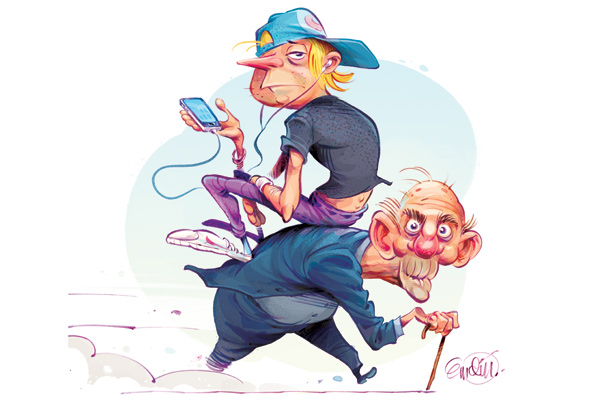When asked to fill in my nationality – and when the option’s available – I always specify ‘English’. Partly because I don’t have an ounce of Scottish or Welsh blood, but mostly because the very name ‘United Kingdom’ has lost all meaning. We are disunited. Brexit v Remain, North v South, Corbyn v Everyone. And – we are informed by those in the know – Old v Young.
The Brexit vote appeared to confirm what moaning millennials have long believed: that the baby boomers had it all and squandered it on themselves, leaving the young to fight to the death for a ratty bedsit in Walthamstow. How dare the wrinklies vote to leave the EU when they’ll all be dead soon?
Columnists, economists and sociologists talk about the baby-boomers with their free universities and cheap mortgages: this lucky post-war generation, who invented pop and teenagers, believed they could change the world. Now, it’s all doom and gloom, and we might as well throw in the towel before the ice caps melt and we all die.
This hypothesis is bollocks, for a variety of reasons. First, it’s a myth that baby-boomers had life easier than millennials. Poverty in post-war Britain was far worse than it is now. If you dumped a kid from contemporary Brixton or Hulme into their bombsite equivalent of 50 years ago they’d think they’d been dumped in Aleppo. Yes, you could walk out of one job and into another: but that job was probably dirty and monotonous, in a factory or a mill, and your take home wage bought you a lot less. Higher education may have been free; but that’s because only 12 per cent of school leavers went to university.
There’s also the inconvenient fact that between the baby-boomers and the millennials there was a lost generation: mine. The one whose parents were young in the sixties and whose kids are growing up in the tweenies but who grew up in the 1980s when de-industrialisation was at its peak; when Tebbit advised us to get on our bikes and Yosser said Gizza job; when racism was endemic and riots more prevalent; when there was a genuine terror of nuclear war, not helped by the public information films on the subject; when few of us owned a telly or a house phone let alone a computer; when there were four TV channels and the only curry we knew was a Vesta. With raisins. Dylan Moran touched on this unfairness in a brilliant routine where he bemoaned the fact his parents grew up in an age of the Beatles, the Stones, dope and the Pill; whereas for eighties kids, haunted by Aids and Noel Edmonds, it was: ‘If you have sex you will DIE! But never mind, here’s MC Hammer…’
I read recently that I am part of Generation X, born between 1960 and 1980 (presumably the hippie generation before mine were Generation VW and after mine came Generations Why and Zzz). But there’s a world of distance between someone born in 1960 and 1980. They grew up in different worlds and had utterly different experiences of politics, education, culture.
There’s another, even more salient point about the so-called generation gap: it doesn’t exist. There are no clean lines where one generation ends and another begins. I write from Pontins in Southport. One of the things I’ve noticed, apart from the correlation between someone’s body weight and the acreage of flesh on view, is that the generations are blurring. There are 75-year-olds in tracksuits and tattoos who pogoed or dropped acid. There are thirty-something grandparents, fifty-somethings on go-karts and eight-year-olds in heels. And they all mix and mingle; defined by their accents, football teams and what they drink rather than by age.
I’m sat in the arcade as my kids play Minecraft and Sims 3 on huge LED screens. If I were to inform that sixty-something in a Liverpool top drinking lager as he puts coins down the slots that he’s squandered his advantages and blown it for his grandson, also in an LFC top, shooting electronic zombies beside him, they’d regard me quizzically and politely enquire if I was a divvie. Because the only gap that has ever mattered in this or any other country isn’t age, race, or region: it’s class. It’s about who you support, where you’re from, the balance in your account.






Comments